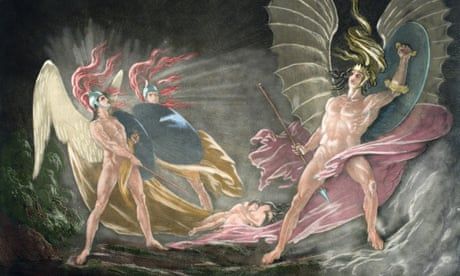
Orlando Reade’s fascinating study of John Milton’s famous work, through the eyes of myriad readers from Malcolm X to white supremacists, shows how it has provoked the widest range of responses and interpretations
In Dan Brown’s thriller Angels and Demons (2000), the protagonist, Robert Langdon, combs the Vatican archives for proof that the astronomer Galileo Galilei was involved with the sinister secret society known as the Illuminati. He is stunned to discover a manuscript containing four cryptic lines of poetry, not in Latin or Italian, but, his companion tells him, “written in English”. “English?” Langdon gasps, disbelievingly (the breathy italics, just two of hundreds of examples in the novel, are both Brown’s). Not only are the lines in English (English? English!), but their author, despite belonging to a clandestine group, has obligingly put his name to them: “The poem is signed John Milton.” Even as Langdon’s mind boggles, it helpfully spells out the relevant facts: “John Milton? The influential English poet who wrote Paradise Lost?… he was still dazed over the document’s spellbinding implications.” Warning – more italics incoming: “John Milton was an Illuminatus.” While the revelation might not quite be as mind-blowing as those to come in Brown’s next novel, to literary buffs the prospect of Milton the Illuminatus might be almost as sacrilegious as the idea of Christ’s fruitful loins at the end of The Da Vinci Code.
It’s arguably too easy – albeit enjoyable – to make fun of Brown’s overblown plotting and prose. What makes this episode worthy of note is that it is just one entertainingly silly instance of Milton’s remarkable tendency to pop up in unexpected places in the centuries since his death, like some kind of poetically visionary, ferociously erudite, fervently anti-monarchical jack-in-the-box. This tendency is the subject of Orlando Reade’s thoughtful, wide-ranging and astute book. In 12 short and elegant chapters, Reade examines a range of contexts in which – and writers for whom – Milton’s great epic poem Paradise Lost has come to matter, both as an object of fascination in its own right, and as a flexible instrument with which to probe and ponder a variety of psychological, social and political predicaments. Each chapter has a chief protagonist, but arrays around them a set of contemporaneous responses to Milton that adds richness and texture to the narrative.
Continue reading...